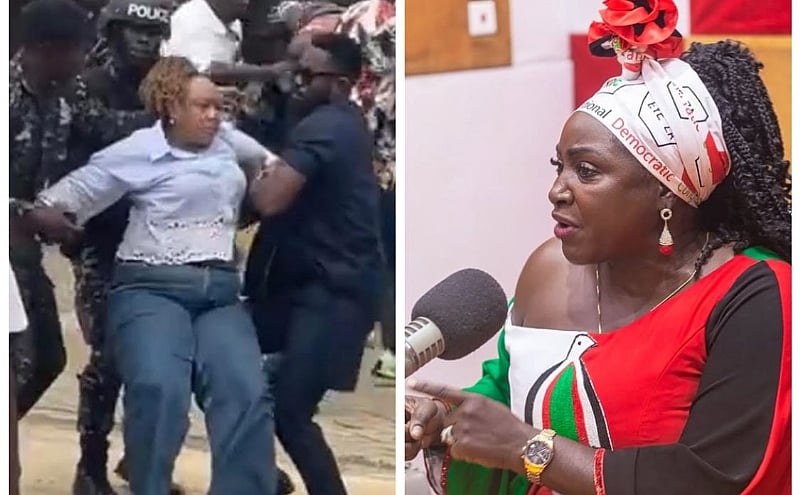The Ablekuma North parliamentary rerun election, held on July 11, 2024, was tragically marred by violence, raising serious concerns about the state of democratic processes in Ghana. The incident, which saw armed men invade a polling station, assaulting several individuals, including journalists and the former Fisheries Minister, Mavis Hawa Koomson, ignited a heated debate about political violence and accountability. The events unfolded against a backdrop of rising political tensions and accusations of past misconduct, with key figures on both sides of the political divide expressing condemnation while also trading blame for the escalating violence.
Dr. Hanna Louisa Bissiw, the National Women’s Organizer of the National Democratic Congress (NDC), expressed a stark lack of sympathy for the assaulted former minister, Koomson. Bissiw justified her stance by pointing to Koomson’s alleged involvement in previous incidents of political violence, including the 2019 Ayawaso West Wuogon by-election, where Bissiw claimed to have been a victim of an attack orchestrated by Koomson. She further cited incidents in Kasoa involving shootings and fatalities, allegedly linked to Koomson. Bissiw’s pronouncements underscore a deeply rooted distrust and animosity between opposing political factions, suggesting a cycle of violence and retribution that threatens the integrity of Ghana’s democratic institutions. Her refusal to condemn the violence outright raised questions about the extent to which political loyalties influence perceptions of justice and accountability.
In contrast, former Vice President Dr. Mahamudu Bawumia, the 2024 New Patriotic Party (NPP) flagbearer, condemned the violence unequivocally. He lamented the attacks on NPP supporters and party officials, including the parliamentary candidate and the deputy national organizer, highlighting the apparent inability of the police to protect them. This criticism of law enforcement’s effectiveness in maintaining order and preventing violence adds another layer of complexity to the situation, raising concerns about the neutrality and capacity of security forces to ensure peaceful elections. Bawumia’s call for the perpetrators to be brought to book reflects a desire for accountability and justice, emphasizing the importance of upholding the rule of law in a democratic society. His warning that those responsible would face consequences, even if delayed, suggests a determination to pursue justice beyond the immediate aftermath of the election.
The contrasting reactions of Bissiw and Bawumia highlight the deep political polarization in Ghana, where interpretations of events are heavily influenced by party affiliations. Bissiw’s focus on alleged past actions by Koomson and her refusal to condemn the violence directed at her underscores a sense of justified retaliation. On the other hand, Bawumia’s condemnation of the violence and call for prosecution emphasizes the importance of upholding democratic principles and the rule of law, regardless of political affiliations. This divergence in perspectives demonstrates the challenge of achieving a shared understanding of events and a common commitment to peaceful democratic processes in a highly charged political environment.
The violence that erupted during the Ablekuma North rerun election raises critical questions about the future of Ghana’s democracy. The incident reveals a disturbing trend of escalating political violence and a growing sense of impunity among those involved. The inability or unwillingness of law enforcement to effectively protect citizens and prevent such acts further undermines confidence in the integrity of the electoral process. The contrasting responses from key political figures, reflecting deep-seated partisan divisions, make finding a path towards peaceful and credible elections even more challenging.
Addressing this escalating problem requires a multi-pronged approach. Strengthening law enforcement capacity and ensuring their impartiality are crucial first steps. Holding perpetrators accountable, regardless of political affiliation, is essential to deter future violence. Furthermore, fostering a culture of dialogue and tolerance between opposing political factions is critical for building a more peaceful and democratic society. Ultimately, the responsibility for ensuring free and fair elections rests not only with the government and security forces but also with political leaders and citizens, who must commit to upholding democratic principles and rejecting violence as a means of achieving political goals. The events in Ablekuma North serve as a stark reminder of the fragility of democracy and the urgent need for collective action to protect it.


